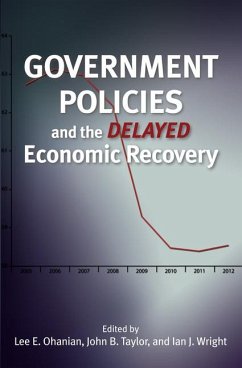The recovery from the recession of 2007-9 has been the weakest in American history. Employment growth has been especially weak: three years after the recovery began, a smaller percentage of the working-age population was employed than when it began. The slow recovery raises fundamental economic and public policy questions: What has been the cause? What can be done to restore robust economic growth? Can a slow-growth America lead the world? Government Policies and the Delayed Economic Recovery examines the reasons for the weak recovery from the recent US recession and explores the possibility that government economic policy is the problem. In his insightful opening chapter, George Shultz explains why diagnosing the situation and then finding a solution to the problem of slow growth is extraordinarily important. If a slow-growth America becomes the new normal for the twenty-first century, not only will the future prosperity of the United States be sacrificed but so too will American leadership worldwide. Following his analysis, the book then focuses on six empirical research studies that examine issues from policy uncertainty to increased regulation as the reasons for slow growth. Taken together, the contributors to this volume offer a broad-based assessment of how government policies are slowing economic growth: by creating uncertainty and unpredictability, engendering short-term planning horizons, and depressing the incentives for businesses to hire new workers and invest in capital and new technologies. The book concludes with key recommendations to help restore prosperity, including a broad-based tax reform that cuts tax rates, equalizes tax treatment across all types of capital, broadens the tax base, confronts entitlement spending, and, more broadly, reduces government spending as a percentage of GDP, as well as reforming unemployment benefits to reward job acceptance and accumulating human capital. The implications are clear: the future of both the American and the world economy is riding on an excellent diagnosis of the problem and appropriate changes in policy.








